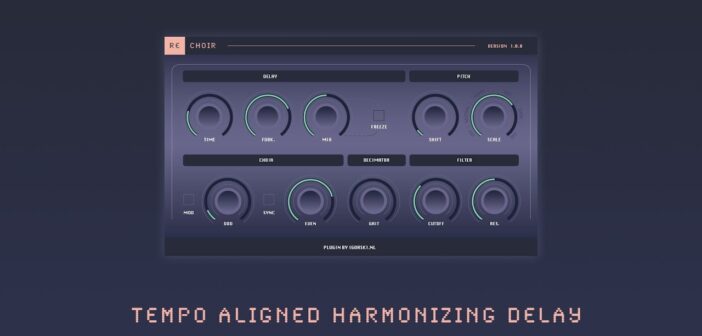Igorski Released Rechoir, a freeware delay effect in VST2 and VST3 plugin formats for Windows and macOS (AU support expected soon).
Delays are one variety of effects that open themselves up to endless possibilities. Developer Igorki’s Rechoir is one such take on a novel delay.
Rechoir certainly operates as a host syncable delay, but where it differs from its peers is in its ability to alter the pitch and add harmonies to the taps it produces.
The interface is utilitarian, presenting all controls with clear labeling. The first section is for control of the delay itself, with controls for syncing to the host’s tempo or operating off timing alone. Also present in the delay’s controls are a freeze function, which was fairly easy to coax some unruly noise out with when running the feedback at higher levels.
As the star of the show, the pitch section has some interesting controls which are thankfully easy to grips with. The shift knob dials in the percentage of pitch shifting being applied to the taps. Scale is also present and acts as a quantizer for the pitch-shifted taps to fit into scales with the labels neutral, happy, sad, dark, and evil.
In practice, these are just the modes with neutral acting as the Major scale, happy as Mixolydian, and so forth.
Rechoir is an interesting feature, allowing producers to harmonize the taps as a means of modulating the taps. These act as independent delay lines, which are also synced to the host. They seem to add complimentary timbres to your specified scale and have a rather unusual quality about them.
Decimator is a typical bitcrusher, which sounds perfectly fine when applied to the taps. The artifacts present add character and grit at lower percentages, and can quickly make the delay sound like it’s being crunched through a 1-bit register when pushed to maximum percentages.
Rechoir isn’t a delay for all seasons, but it is a splendid creative effect that can add some additional textures when coupled with your favorite heavily diffuse reverb.
Windows and macOS are supported, and installation is a simple copy/paste to your plugin folder of choice. Windows host support is 64-bit only, with VST2 and VST3 formats provided. Mac users don’t have explicit Silicon M1 support. Apple users only have access to VST2 and VST3 as well, with no indication of a forthcoming AU.
Download: Igorski Rechoir
More:



15 Comments
yzcoruhT
onWow! Looks interesting. Thank you!
alex
onThx! I’m a huge fan. I’ve been using FogPad a lot lately, but all the others are great and get used, too.
Corti.Son
onHi, another great plugin by Igorski.
Wicked software for wicked sounds. Nice.
Numanoid
onThanks for the info, I will check it out
samuel
onanybody else had securities issues on mac? (i’m on catalina)
i get that we have to go to system preferences – security – open anyway, for any not signed developer, but this does not work for plugins, only for full applications
what is the way around this?
Wing Yee
onIt doesn’t show the amount I apply making it hard to adjust to taste. The concept is good but not new. I prefer the old 32 bit Stratum where I can easily see and adjust the sync tempo and pitch accordingly.
John
onIn Reaper you can change GUI to generic one and you’ll see the amounts. :)
alex
onWhy would you need to see something to adjust sound to taste? I hugely enjoy using the plugins with no conventional readouts and metering like Igorski or Airwindows and with strangely named controls that make you listen to what they’re actually for to be able to use them (BTW, those strange names sometimes describe what plugin does to the sound better than usual ones :)).
John
onIn Reaper you can change GUI to generic one and you’ll see better labels and numbers. :)
Jon
onfree speedrum lite updated to v1.0 http://www.apisoniclabs.com, some really nice improvements
alex
onThx, but unfortunately Reaper doesn’t like this version, it reported an error and wouldn’t to load it :(
MRG
on+1 :(
John
onVST3 works nicely on Windows.
Tom Smith
onHi … it’s a nice plugin but maxxed out my DAW (BespokeSynth) at 100% everytime I used it.
David
onI downloaded Rechoir and immediately found something I liked the sound of when added as an effect on a synth, but there seems to be a problem with the plugin. When I stop playback and play the sequence again from the start, it doesn’t reproduce exactly the same effect as the first time round. It seems like the plugin carries on playing when the DAW is stopped, even though you can’t hear the echoes after they’ve faded out. The result is that the patterns it plays drift over time and gradually the plugin produces a completely different sounding set of echoes, becoming progressively less bright. If I have it running it long enough, it eventually becomes almost completely silent.
I’ve tried bypassing and adjusting feedback and sync but nothing seems to reset it back to the state it was in when first loaded. The only way I’ve found to reset it is to delete the plugin and reinsert it. It’s annoying because in this case the effect I like best is when it’s been playing for a few minutes, not when it’s first loaded. I haven’t tried rendering an audio file yet so I don’t know what it will do then.
Has anyone else had these problems? I’m running it in Cakewalk.